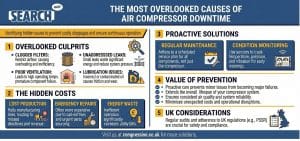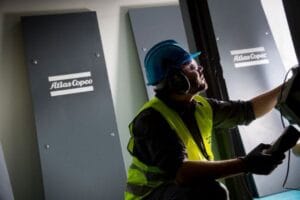The Most Overlooked Causes of Air Compressor Downtime
When an air compressor unexpectedly stops, it’s more than just a mechanical problem; it’s a significant business setback. Compressed air is considered the fourth essential utility in any industrial setting in the UK, and its failure can lead to immediate financial and operational repercussions.
While many focus on major component breakages, the stark reality is that over 70% of all downtime stems from preventable, slow-burning issues – the silent killers of compressor reliability. The true cost isn’t just the repair bill. It’s the lost revenue from stopped production, the wages of an idle workforce, and the risk of damaged client relationships.
This guide exposes the most frequently overlooked causes of an air compressor breakdown and provides the knowledge to shift from reactive repairs to proactive reliability.
For businesses partnered with Search Air, this means transforming a potential liability into a consistently dependable asset.
Foundational Flaws: Causes From Day One
Many chronic reliability problems aren’t random. They’re guaranteed by foundational errors made during installation and within the compressor room itself.
Poor Ventilation and Dirty Intake Air
Operating a precision machine in a hot, dirty, and confined space negates its longevity. Air compression generates a significant amount of heat, and the system’s cooler requires a constant flow of cool ambient air.
- Poor Ventilation: The heat produced is trapped, increasing the temperature in the room. For every 10 °C increase in intake temperature, the unit loses up to 5% of its efficiency, resulting in a higher draw on energy consumption. The unit remaining hot degrades the lubricant and causes valve deposits and premature bearing failure.
- Contaminated Intake Air: A clogged air filter will pull abrasive dust and other particulates right into the compressor. The contaminants are like liquid sandpaper on rotors and other internal components. They cause premature wear on components and foul the lubricant.
How to Prevent This:
- Keep the compressor room fully ventilated to help remove excess heat.
- Maintain the surrounding area of the compressor to make sure it’s clean of any dirt or dust.
- Check and replace the intake air filter regularly as recommended by the manufacturer.
Shaky Ground and Vibration
An air compressor must be mounted on a smooth, level, rigid surface. An uneven surface that permits too much vibration will loosen vital electrical connections, stress pipework, causing fatigue leaks, and increase the wear on vital rotating parts such as bearings, leading to early failure.
How to Prevent This:
- Make sure the compressor is mounted on a professionally installed, level foundation.
- Install vibration-damping pads beneath the compressor.
- Add bolt tightening checks to your maintenance schedule.
Improper Pipe Sizing and Pressure Drop
One of the most common design flaws is undersized distribution piping. This creates friction, causing a significant pressure drop between the compressor and the point of use. To compensate, operators often increase the discharge pressure. This “artificial demand” is a costly mistake.
- Increased Energy Costs: For every 1 bar increase in discharge pressure, energy consumption rises by approximately 7%.
- Accelerated Wear: The entire system is forced to work harder, not to meet genuine production demand, but to overcome the resistance of its own flawed network.
- Atlas Copco Advantage: Modern systems like Atlas Copco’s AIRnet modular aluminium piping are specifically engineered with low-friction inner surfaces to minimise pressure drop and prevent artificial demand.
How to Prevent This:
- Have your piping system professionally designed based on flow rate and distance, not just the compressor outlet size.
- Consider upgrading to low-friction piping systems like AIRnet.

Most air compressor downtime is caused by small preventable issues not major component failure
Maintenance Lapses that Cause Failures
Foundational flaws often set the stage. But it’s the accumulation of minor maintenance oversights that often delivers the final blow.
Systemic Air Leaks
Often dismissed, compressed air leaks represent a massive source of wasted energy. In a poorly maintained system, leaks can account for 20-30% of the compressor’s total output.
- A single 3mm leak in a 7-bar system can cost over £2,000 per year in wasted electricity.
- Leaks force the compressor to run longer and cycle more often, accelerating wear on every part.
Search Air’s ultrasonic Compressed Air Leak Detection service pinpoints these costly leaks without disrupting your compressor operation, often saving businesses thousands annually with a money-back guarantee.
How to Prevent This:
- Schedule regular ultrasonic leak detection surveys.
- Train staff to listen for audible hissing and report it immediately.
Incorrect Lubrication and Contamination
Using the wrong oil or extending change intervals is a false economy. Degraded lubricant forms sludge that blocks filters and coolers, causing overheating and component seizures. Oil separators and filters that become clogged by this degraded lubricant are a major cause of shutdowns.
- For sensitive industries like food & beverage or pharmaceuticals, contamination is not an option. Atlas Copco’s ZR/ZT range of oil-free compressors are ISO 8573-1 Class 0 certified, eliminating any risk of oil carryover.
- Atlas Copco Advantage: Genuine Atlas Copco parts, including the correct separator and filters for your machine, ensure optimal performance and prevent costly damage.
How to Prevent This:
- Remember to strictly follow the manufacturer’s recommendations. Especially regarding lubricant type and change intervals.
- Use only genuine, high-quality filters and separators.

The Most Overlooked Causes of Air Compressor Downtime
Improper V-Belt Tension
The tension of a V-belt must be just right. A belt that is too loose will slip, generating intense heat that causes it to crack and fail prematurely. A belt that is too tight places extreme side-load on motor and airend bearings, causing them to wear out at an accelerated rate and potentially leading to a complete motor burnout.
How to Prevent This:
- Use a proper tension gauge during belt installation and checks.
- Ensure pulleys are perfectly aligned using a straightedge or laser tool.
Poor Condensate Management
Water is a natural byproduct of air compression. Failure to consistently remove this liquid from automatic drain traps is a primary cause of system-wide degradation. When drains fail, water is carried downstream where it:
- Causes internal corrosion of the air receiver and pipework.
- Damages pneumatic tools.
- Ruins the desiccant in air dryers, compromising air quality.
- It can freeze within outdoor pipe runs during winter, causing blockages or splitting pipes.
How to Prevent This:
- Manually test drain traps daily. This will help to ensure they are functioning properly.
- Clean or replace clogged drain traps as a part of your regular routine maintenance.
Misdiagnosing Deeper System Faults
Some of the most destructive conditions are not caused by a single failing part, but by a misunderstanding of the system’s operational dynamics.
The Destruction of Short-Cycling
Short-cycling – the rapid and repeated loading and unloading of the compressor – inflicts extreme mechanical stress on motor contactors, starters, and valves. The root cause is almost always a system design issue, such as an oversized compressor or an undersized air receiver.
A comprehensive Compressed Air Audit is the most effective way to identify these system-level inefficiencies that lead to recurring compressor failure.
Unmasking Electrical Faults
A tripped circuit breaker is a symptom, not a diagnosis. Repeatedly resetting it is a prelude to major component failure and costly Air Compressor Repairs and Breakdowns. A failing bearing, for instance, can increase rotational friction, forcing the motor to draw more current and trip its overload relay – a mechanical problem manifesting as an electrical symptom.
- Atlas Copco Advantage: Modern compressors with Elektronikon® controllers and air compressor SMARTLINK remote monitoring provide detailed fault logs and real-time data. This allows engineers to diagnose the true root cause of a shutdown quickly and prevent repeat issues.
How to Prevent This:
- Treat tripped breakers as a serious warning. Remember to always investigate the root cause.
- Consult a qualified technician to diagnose complex electrical and mechanical faults that you may not be able to handle yourself.
Using UK Compliance as a Reliability Framework
For Health & Safety Managers, regulations are more than legal hurdles; they are powerful frameworks for driving reliability.
- PSSR 2000: The PSSR requires a Written Scheme of Examination (WSE). These mandatory inspections help spot corrosion and valve issues early, preventing failures before they happen. Search Air provides expert assistance in developing and managing PSSR-compliant schemes.
- PUWER 1998: This regulation requires that work equipment is maintained in a safe condition, providing a powerful regulatory justification for adhering to proper service schedules. Considering the high Air Compressor Maintenance Costs associated with failure, this is a vital perspective.
- COSHH: Under the Control of Substances Hazardous to Health regulations, oil mists from compressors must be controlled. This ties directly to ensuring intake air is clean and oil separation systems are properly maintained.
Shift to a Proactive Culture and Take Control
Hostile operating conditions, poorly designed systems and a build-up of cumulative deferred maintenance – these are the usual causes of air compressor downtime. The risks are generally not due to unforeseeable events. Instead, they are predictable. The best way to ensure reliable performance is to build a support environment for your equipment in which failure is a much lower risk.
One where you are committed to professional installation and maintenance of air compressor UK service by expert engineers, and where you invest in efficient and reliable technology. An Atlas Copco GA Series VSD compressor can cut energy use by up to 50%, and a heat recovery system will reclaim up to 94% of the heat generated.
Stop reacting to failures and start preventing them. Search Air provides the expertise and services to ensure your compressed air supply is a dependable and powerful asset that contributes to your bottom line. To learn How to Make Your Air Compressor More Efficient and protect your facility from the high cost of unplanned downtime, partner with an expert.
- Book a Comprehensive Air System Audit: Our factory-trained engineers will identify the hidden risks in your system. Contact us to schedule your audit today.
- Contact Our Experts: Have a specific question? Talk to a specialist for bespoke advice on our maintenance and service plans.
- Request an airCHECK: Arrange a free visual inspection of your compressed air system to diagnose common issues and recommend improvements.

